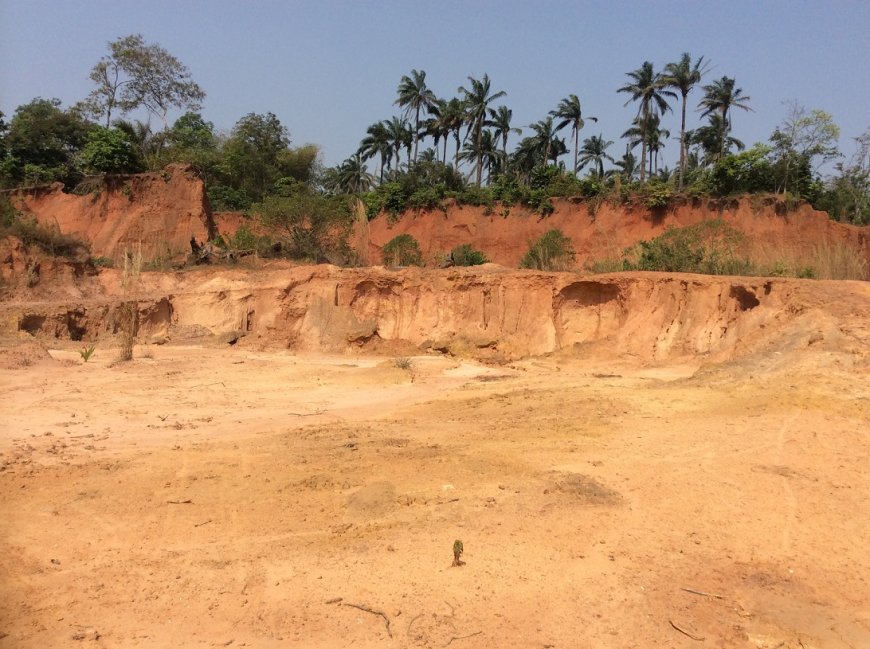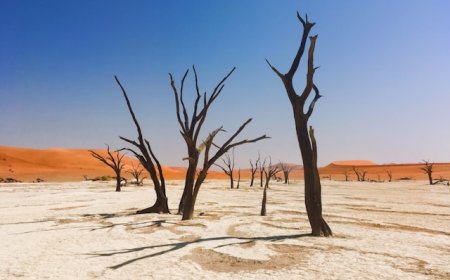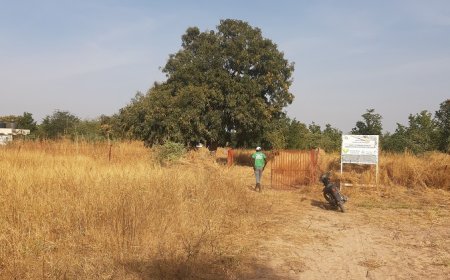Executive Summary
Introduction
With its multiple adverse impacts on human and ecological systems, climate change has become an issue of great concern globally. Nigeria is ranked as one of the most climate vulnerable countries in the world, despite the fact that it accounts for the least amount of global greenhouse gas (GHG) emissions. This vulnerability has been attributed to the country’s complex agroecological zones, burgeoning urban and rural populations, extensive coastline vulnerable to sea level rise and storm surges, as well as underlying economic challenges and a weak governance system. The systemic risks posed by the burgeoning climate crisis in Nigeria have triggered more frequent outbreaks of infectious diseases, communal conflicts, farmer–herder crises, loss of livelihoods, loss of aquatic and terrestrial biota, decreasing food security and rising economic crises. These issues have been exacerbated by a lack of climate finance, especially for sustainable adaptation initiatives, coupled with lack of basic amenities, inadequate infrastructure and inequality.
To mitigate these challenges, the Nigerian government has developed several climate change adaptation and mitigation plans and frameworks, such as the Nationally Determined Contribution (NDC), the National Adaptation Plan Framework (NAPF), the National Strategy and Plan of Action on Climate Change in Nigeria (NASPA-CCN), the Climate Change Act (CCA) and the Medium-Term National Development Plan, to name a few. However, despite establishing several adaptation priority sectors in its NDC, NAPF and NASPA-CCN, Nigeria does not have a clear idea of the status of adaptation activities on the ground, and so there is no clear evaluation of implementation gaps and locally led processes.
Furthermore, Nigeria’s current climate adaptation plan utilises a ‘top-down’ approach without including frontline communities and stakeholders – with their traditional knowledge, cultures, norms and values – in the decision-making process. Therefore, the Nigerian government needs to mainstream locally led adaptation (LLA) in its adaptation plans, to ensure effective, efficient and equitable delivery of adaptation actions. This will give local communities agency over the designing, monitoring and evaluating phases of the adaptation actions. In view of this, the current research project ‘Climate Adaptation Strategies, Initiatives and Practices: Issues and Pathways in Nigeria’ was initiated by the Africa Policy Research Institute (APRI) with particular focus on the adaptation components of Nigeria’s NDC and other national frameworks. The project seeks to evaluate the challenges and opportunities in Nigeria’s adaptation policies as well as any implementation gaps, especially as they relate to LLA. The project also seeks to assess the barriers, challenges, entry points and opportunities of climate adaptation strategies at the local level through a deep dive into three case studies in rural communities.
Research objectives
- The specific objectives of this research are to:
- understand the status and trends of climate actions, including the financial implications, policies, strategies and implementation frameworks for addressing climate change;
- evaluate the adaptation needs, priorities, knowledge gaps and implementation gaps at the community level;
- examine the experiences and contextual narratives of climate impacts and the strategies, adaptation actions and practices employed by local communities;
- understand the challenges and barriers faced by frontline communities;
- learn and document the potential opportunities and entry points for effective adaptation actions with the potential for scale-up at the local and regional levels;
- assess the adaptive capacities of local communities in Nigeria with global best practices for broader adaptation actions and environmental sustainability.
Approach and methodology
The research approach and methodology included mapping Nigeria’s climate policy landscape, implementation strategies, practices and actions at the local and national levels. It draws on the policy landscape mapping and deep dives into adaptation strategies, initiatives and practices at the local level. The national mapping of Nigeria’s NDC consists of three key tasks that assess policy frameworks for climate action, the capacity of stakeholders to take into account local adaptation strategies and the coherence or inconsistency of local adaptation policies with the country’s needs, priorities and international development goals and commitments. Two stakeholder engagement meetings were held with diverse national, regional and local stakeholders operating in the field of climate change, with a view to situating the research objectives in the context, needs and priorities of Nigeria policy makers and broader society. Finally, the team conducted three deep dives which fell within the three priority sectors of Nigeria’s NDC.
Case I: Biogas production for forest conservation in Nigeria
This case study assesses the LLA initiatives and practices of smallholder farming communities in Owode, Ogun State, south-west Nigeria. The research sought to understand how the rural community is adapting to the impacts of climate change by converting organic waste generated from crops, livestock and poultry farming into a clean energy source (biogas), thus conserving the nearly depleted forest resources and restoring biodiversity.
Case II: Climate change adaptation strategies in the fisheries and aquaculture sector of Nigeria
This case study evaluates the narratives and adaptation strategies of fish farmers against the impacts of climate change in Abesan and Shagari estates, Lagos. Due to the collapse by 60% of Nigeria’s fisheries and aquaculture sector, and the associated socio-economic challenges, the fish farmers are integrating a lot of LLA strategies into their farms, such as drilling deeper boreholes, installing water treatment plants, introducing locally sourced feeds and performing hybridisation to produce a more rugged and disease-resistant fish. These initiatives and practices have helped fish farmers to sustain their livelihoods.
Case III: Adaptation practices of rural communities to land degradation in south-eastern Nigeria
This case study examines the actions, barriers, challenges and opportunities behind the adaptation practices of a rural community against land degradation in Abatete, Anambra State, south-eastern Nigeria. The findings revealed that community members have devised traditional methods to curb the effects of soil/gully erosion and landslides on roads and vegetable/crop farms. These include planting erosion-resistant trees at soil/gully erosion sites, placing sandbags at active gully erosion hotspots and making high ridges/mounds around vegetable beds to control soil erosion. The actions taken by the community members have led to a significant reduction in the evolution of sheet and rill erosion into ephemeral and permanent gullies, as they identify potential gully erosion hotspots in time and apply the necessary preventive measures to avert potential disaster and property damage.
Key findings
The study provides extensive insight into the LLA strategies as adopted by different communities in order to address the impacts of climate change on their livelihoods. The key findings are summarised below:
- Despite the limited access to climate finance and technical capacity, community-led adaptation is a reality of climate action in Nigeria and is well aligned with the priority options of the NDC as well as other national and regional climate action and social and economic development policies. The major challenge facing the delivery of climate change adaptation in Nigeria is that the topic has yet to feature in mainstream national discourse.
- While Nigeria has developed adaptation policies and implementation strategies, the adequacy and efficiency of those policies and strategies are yet to be evaluated in a way that provides evidence for improvement and broader climate action, including the recognition, documentation and inclusion of local voices and ongoing adaptation strategies and practices. The other pervasive concern connected with climate adaptation in Nigeria is the limited political will to confront it as a critical national issue and the consequent limited financing of such endeavours.
- The impact climate change is having on the Nigerian economy, and the projected increase in the intensity of negative impacts on lives and livelihoods, means that LLA holds the most promise for far-reaching and sustained solutions. Both public and private sector funding for adaptation falls very short of the total amounts needed to tackle the ever-increasing risk of an unfolding climate emergency. In the absence of a generally accepted, if not ubiquitous, adaptation process, adaptation practice is characterised by independent endeavours from local communities, international organisations and government agencies. Collaboration is limited between ministries and government agencies with different roles in the climate change administration, and science-based targets are yet to become mainstream enough to inform planning and legislation.
- LLA strategies are led by local stakeholders and adopt bottom-up, community-driven initiatives which are tailored to the local needs, resources and capacities of community members. They build the capacity of local actors to plan and implement adaptation activities and to link local and global resources to support adaptation initiatives. This bottom-up approach could unlock the potential and benefits of climate action in Nigeria, especially at the local level, where such actions are urgently needed.
The results presented in this report provide impulses for local, regional, national and global policy makers and implementers on the inherent value and importance of LLA adaptation approaches for broader climate action and the socio-economic development and well-being of local communities.
Structure of report
The rest of the report is organised into five sections.
Section 1 provides a general introduction to the project, and outlines the climate change status, trends and needs in Nigeria.
Section 2 presents a scoping review of key policy documents on climate adaptation in Nigeria with an emphasis on the adaptation component of Nigeria’s NDC; Nigeria’s climate adaptation strategies, national policies and actions, and local strategies and practices; and the country’s climate finance flows. The final section of this chapter maps the key stakeholders in Nigeria’s climate adaptation landscape and highlights the challenges, gaps and opportunities.
Section 3 presents the findings of the deep dive case studies undertaken across different parts of Nigeria to explore some of the local adaptation practices employed in response to deforestation and energy poverty, food security and land degradation (environmental sustainability).
Section 4 presents a general analysis and discussion of the project results while Section 5 presents the conclusions and main messages.
Insights into Nigeria’s climate change policies, initiatives and local actions
About the Authors
Dr. Chukwueloka Udechukwu Okeke is a Senior Lecturer at Anchor University, in Lagos State, Nigeria. His research interests span climate change adaptation, environmental sustainability, nature-based solutions, geological hazards, disaster risk reduction, and anthropogeomorphology. He previously worked as a Lecturer at Covenant University, in Ota, Nigeria, where he taught core subjects in Geotechnics and Geoenvironmental Engineering. He is a member of the Commonwealth Futures Climate Research Cohort and a corporate member of several internationally recognised professional organisations. He holds a BSc degree in Geology from the University of Nigeria, Nsukka. He was a recipient of the MEXT Scholarship, which culminated in the award of MEng and PhD degrees in Engineering Geology from Shimane University, Japan. He currently serves as an editorial board member of Geoenvironmental Disasters – a SpringerOpen journal.
Dr. Chinwe Victoria Ogunji is a Research Assistant for “Climate Adaptation Strategies and Initiatives: Issues and Pathways in Nigeria”. Chinwe is an academic staff at Alex-Ekwueme Federal University, Ndufu Alike, Ebonyi State Nigeria with over five years of teaching experience. She has a PhD in Social Studies Education with a focus on Climate Change Education/Enlightenment and worked hard to promote climate change awareness in secondary school system of Ebonyi State, Nigeria. She is a fellow of the Center for Climate Change and Development (CCCD), AE-FUNAI, Ebonyi State, Nigeria.
Ethelbert Elochukwu Anieze is a Research Assistant for the project “Climate Adaptation Strategies and Initiatives: Issues and Pathways in Nigeria”. Elochukwu is a statistician with over five years of experience in data collection, Mapping, Quantitative and Qualitative data analysis. Elochukwu is part of the team working on the ongoing Nigeria Deep Decarbonization Pathway project as a research assistant. He also works as a research assistant in the International Climate Politics Hub (ICPH) project funded by the European Climate Foundation. He is currently a Research Assistant at the Centre for Climate Change and Development Alex Ekwueme Federal University, Ebonyi state Nigeria.




